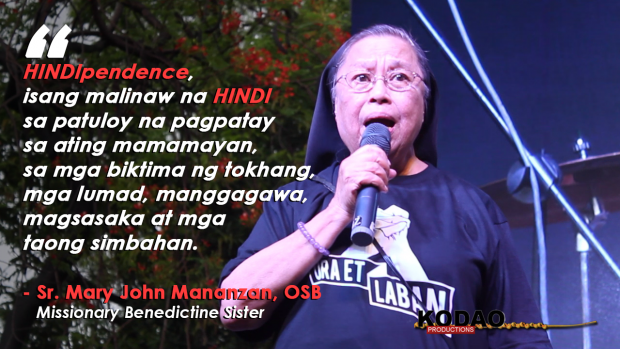Pahayag ng mga pamilya ng mga biktima ng Ampatuan Massacre tungkol sa panandaliang paglaya ni Zaldy Ampatuan
Kaming mga naiwang pamilya ng 32 mamamahayag na kabilang sa 58 kataong walang awang pinaslang sa Ampatuan massacre noong November 23, 2009, ay kinokondena ang naging desisyon ng Quezon City Regional Trial Court Branch 221 na payagang makalabas ng kulungan at dumalo sa kasal ng kanyang anak ang isa sa mga akusado na si Zaldy Ampatuan.
Labis na nagdurugo ang aming mga puso at sumasabog sa galit ang aming mga damdamin sa pagsasawalang bahala na ito ng korte sa aming mga asawa, anak, kapatid at kaanak na hanggang ngayo’y nagdadalamhati halos siyam na taon na matapos ang pinakabrutal na insidente ng pamamaslang ng mga mamamahayag sa kasaysayan.
Isang insultong hindi katanggap-tanggap para sa amin na malaman na ang isa sa mga nagplano ng karumal-dumal na krimen ay makalalanghap ng hangin ng kalayaan kahit sa maikling panahon para makasama ang kanyang pamilya, isang bagay na habambuhay na ipinagkait sa amin.
Ang mas nakalulungkot dito ay hindi namin ito inasahan at walang nagpaabot sa amin ng impormasyon na dumulog sa korte si Zaldy Ampatuan para umapela na bigyan siya ng permisong dumalo sa isang kasalan. Kung nalaman agad namin ito, hinding-hindi namin ito palalampasin at mahigpit itong tututulan.
Kaya ang tanong namin sa aming tagapagtanggol: Sino ba ang inyong kinakatawan sa kasong ito?
Tanong din namin sa korte: Patas at makatarungan ba na bigyan si Zaldy Ampatuan ng pribilehiyong hindi makamit ng ibang presong may mas magagaang na kaso? Makaaasa pa ba kami ng katarungan para sa aming mga mahal sa buhay?
Sana ay maunawaan kami sakaling may nasaling sa paglabas ng aming nga hinanaing tungkol sa tinatakbo ng kaso. Pero matapos ang siyam na taon at wala pang naparurusahan isa man sa mga maysala, aaminin namin na ang aming tiwala sa sistema ng hustisya ay lubos na nasusubok.
Pagkatapos ng masaker, tinaya ng mga eksperto na aabutin ng sampung taon o isang dekada bago may maparusahan sa krimen na ito. Nalalapit na ang panahon na iyon pero ang pagkamit ng hustisya ay nananatiling mailap.
Sa halos isang dekadang inaasam-asam namin ang katarungan ang bubungad sa amin ay ang pribilehiyong tinamasa niya. Ano ang dapat naming maramdaman?
Sa mga humahawak ng kaso, huwag naman po ninyo paglaruan ang kaso dahil hindi po nakakatuwa.
Reference:
Asawa ni Rosell Morales ng News Focus 6
Tagapagsalita, Justice Now!

